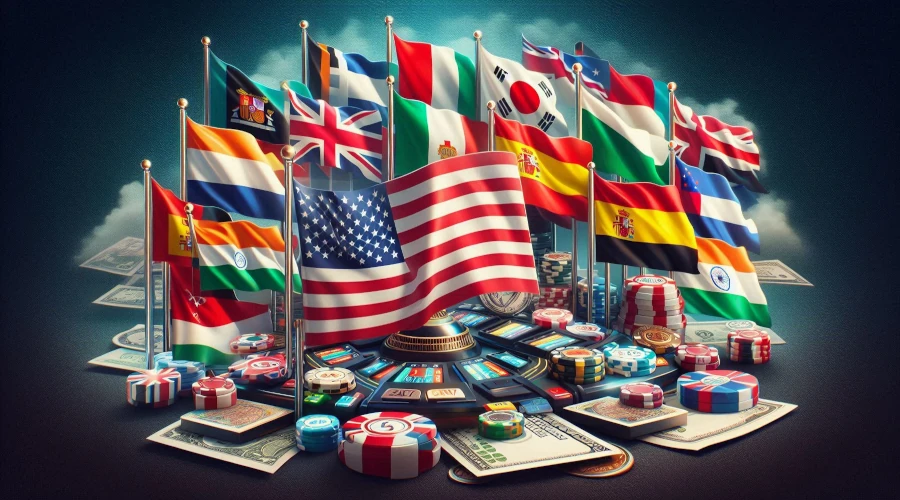 November 27 2024
November 27 2024
The question of whether or not online casinos are legal in your country is asked constantly? We will answer this question using some of the major countries in the world in this guide.
To note, online casinos are seeing a growth in popularity since many countries around the world are legalizing specific types of gambling while implementing necessary regulations meant to safeguard players. As such, we will explain online casinos and their growth in popularity amid the legality concerns that may exist - which we will discuss right now.
Since 2011, Spain has legalized online gambling per the Spanish Gambling Act. In accordance with the law, online casino operators are required to obtain a license in order to make their gambling services available to interested gamers in Spain. It remains one of the more thriving markets today - allowing players to gain access to numerous online platforms so long as they are licensed under the Spanish laws.
One of the most challenging obstacles that online gambling platforms face are not just governmental laws, but also laws based on culture and religion. Such concerns are valid in the case of whether or not gambling is legal in the Middle East including in countries such as the United Arab Emirates. Under Islamic law, gambling - both in-person and online - is illegal at least for the time being. In recent years however, the Emirate government has formed a regulatory body designed to regulate gambling and ensure that such legal measures are relaxed despite Islamic law being the superior law in the region.
The following year, the General Gaming Regulatory Authority (GCGRA) was designed to regulate commercial gaming in the Emirates. The organization will oversee gaming operations both land-based and online including the top rated sites in the Emirates. While this is a step in the right direction, it remains to be seen what the future of gambling will look like in the United Arab Emirates.
For that matter, the country may set the benchmark on how other nations in the Middle East will approach the online gambling issue. Just because the UAE has legalized it to an extent, may not mean that other countries such as Saudi Arabia, Pakistan, or Jordan may follow suit. Yet, the Middle East could be the region to watch regarding the push for legalized online gambling around the world.
What should be noted is that the UAE is one of the hotbed destinations for luxury travelers. The country is known for going all out when it comes to offering the best resorts in the world for such travelers who are willing to spend a lot. Furthermore, legalizing gambling in the country could drive in plenty of new travelers that love to gamble and result in a major windfall for the Emirates regarding the revenue they can earn.
Meanwhile, Saudi Arabia could be seen as a country that might be on the gambling legality radar. The reason for this is that they are the only other country in the region aside from UAE where luxury is associated with their national identity. In the previous year, there was a push to change gambling laws (specifically online gambling). Currently gambling in Saudi Arabia is illegal for both land-based and online gambling. This further proves that the country is holding strong to their Islamic values and it could further curtail any attempts to legalize online gambling in the country and even the rest of the region outside of the Emirates.

The United States is a nation where its gambling laws are more complex to navigate. One of the chief reasons for this is that the laws will depend on one jurisdiction or another. Federal law restricts certain forms of online gambling - but numerous states have completely legalized and regulated online casinos. As of right now, numerous jurisdictions are in the process of opening up the doors for legalization or relaxing certain restrictions.
For those who may be looking to play online casinos in the United States, researching gambling laws should be highly recommended. Nevertheless, online casino operators who are licensed in the United States (where applicable) may program it to where the website will be blocked in jurisdictions where online gambling is prohibited. As for what is being legalized, many states are looking to sports betting being legalized as opposed to complete online casino platforms.
Online gambling is mostly illegal in Japan. However, sports betting and lotteries are legalized - though they are regulated by the government. Pachinko is a culturally popular gambling game but is operating in a so-called grey area in terms of legality. As of September 2024, Japanese law enforcement agencies are investigating offshore casinos that are illegally targeting players in the country.
For online gambling operators, they need to perform the necessary due diligence on gambling laws in numerous countries before targeting players and offering their services. It is obvious that approaching players under the pretense that online gambling is legal in nations where it isn’t can spell trouble for operators. While online platforms are mostly targeted, land-based gambling is legalized to an extent. A land-based casino is scheduled to open in Osaka in 2030 with MGM Resorts operating it under the name MGM Osaka.
Even though online gambling is considered illegal in the country, Japanese players had leveraged available platforms during the COVID-19 shutdowns. In a five year period between 2019 to 2023, Japan’s Society Concerned about the Gambling Addiction witnessed an eye-popping 372 percent increase in reported calls - emphasizing that responsible gambling is so important no matter where you are in the world. Amid the laws, Japanese officials believe that gambling addiction could rise in young people in the coming years - which might hinder any potential measures in legalizing online gambling if such ideas exist.
India has over 1 billion mobile users in the country - one of the largest groups of mobile users worldwide. Nonetheless, the country also makes up 20 to 30 million online gamers that make up nearly 600 million gamers around the world. As for mobile gaming, they are setting the stage for potentially explosive growth for online mobile gambling. As such, India has the potential to become a market that will draw in a ton of revenue for online casino operators. However, the challenge that stands in the way is the legality.
The major law in the books is the Public Gambling Act of 1867. Indeed, the law was implemented at a time where our currently existing technology obviously didn’t exist. As such, it has triggered questions and confusion about whether or not online gambling platforms fall under the purview of the law. Online gambling has seen over 12 million users, signalling that the legality itself is a bit more relaxed than many assume. Still, there are laws and regulations that can be implemented to where it will allow Indian players to enjoy what’s available for online gambling while safeguarding the players accordingly.
In terms of land-based gambling, the legality depends on whether or not it’s legal in each state. Notably, Goa and Sikkim are two prominent states where land-based gambling is legal.
The global push for legalizing gambling worldwide continues. What could stand in the way are countries that may not budge on the idea for reasons such as religious or cultural laws. Some may even question whether such existing gambling laws cover online casinos (such as India’s Public Gambling Act). Nevertheless, it is up to international countries to clarify their gambling laws and make the final determination of whether or not online gambling is legal in their country.
Likewise, if online gambling is allowed, expect regulations to be implemented. While online gambling may be seen as a fun entertainment option, the regulations must be designed to safeguard players. Thus, fair play is instilled and further ensuring that not all online gambling platforms are operating under legal rules.


Curacao-License
 There is a No Deposit Bonus available: 25 Free Spins
There is a No Deposit Bonus available: 25 Free Spins


Curacao-License
 There is a No Deposit Bonus available:
25 Free Spins
There is a No Deposit Bonus available:
25 Free Spins


Curacao-License


Curacao-License


Curacao-License






Malta-License (EU)


Curacao-License




Curacao-License


Curacao-License
 There is a No Deposit Bonus available: 50 Free Spins
There is a No Deposit Bonus available: 50 Free Spins


Curacao-License



Curacao-License
 There is a No Deposit Bonus available:
20 Free Spins
There is a No Deposit Bonus available:
20 Free Spins